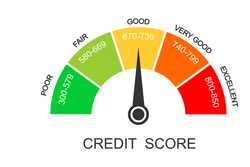What Is a Delinquency on a Credit Report?

Our evaluations and opinions are not influenced by our advertising relationships, but we may earn a commission from our partners’ links. This content is created by TIME Stamped, under TIME’s direction and produced in accordance with TIME’s editorial guidelines and overseen by TIME’s editorial staff. Learn more about it.
A delinquency can show up on your credit report when there are late or missed payments for one or more debts.
Your credit report includes important information about your debts, including your payment history. When you pay late or miss payments to credit cards, student loans, or other debts, your creditors may report those accounts as delinquent to the credit bureaus.
A delinquency on a credit report can be harmful to your credit scores but the impact may depend on how late you are in making payments. Understanding when credit report delinquencies can happen—and how to avoid them—can help you to preserve your score while managing debt.
Delinquencies on a credit report are a reflection of your payment history. When you pay a credit card bill or another debt past the due date, or don't pay at all, your creditor can report that activity to the credit bureaus.
The credit bureaus—Equifax, Experian, and TransUnion—can then include that information in your credit reports. In terms of when delinquencies are reported, it can depend on the type of debt involved and the creditor's reporting policies.
Here's how the different delinquency phases work, according to MyFICO.
If you're 30 days past due on a debt account, that means you've missed at least one payment. At this point, your creditor can report your account to the credit bureaus. You may lose some credit-score points but you might be able to mitigate the damage by bringing the late account current and making all future payments on time.
At 60 days past due, you're now two payments behind. Credit-score impacts are likely to be greater at this point. You may begin getting phone calls or letters from your creditor requesting payment on your account.
Being 90 days past due means you've missed at least three payments. At this stage, your credit scores may have lost significant points. Your creditors may also be on the verge of sending your account to collections if they haven't done so already.
When you reach the 180-days mark, your account is considered to be severely delinquent. Your credit score—which may have already dropped as a result of late payments being reported—can take a further hit if your account is charged-off.
A charge-off means the creditor has written off the account and likely sold it to a third-party debt collector. Charge-offs are the most serious level of delinquency and can have a major impact on credit scores. It's also important to know that your obligation to pay doesn't go away just because the creditor writes off the account. You will likely hear from the third-party debt collector.
There are a few ways to determine whether a bill is delinquent, depending on the type of debt involved.
You can check if a credit card bill is past due by calling the customer service number on the back of the card, or logging in to your online account. Your creditor may also send you email or text alerts notifying you that a payment is due.
Contacting your loan servicer is usually the best way to find out if you're behind on federal or private student-loan payments. You can also check your mail to see whether your servicers have sent written requests for payment.
Medical bills can be added to your credit reports if those accounts go unpaid. Effective as of April 2023, unpaid medical bills that are over $500—and a year old or greater—can be reported to credit agencies. Anything less than that will not be reported. However, it is still important to pay these as quickly as possible. If you have copies of your medical bills, you should be able to find the provider's billing department contact information listed. You can call or email them to check the status of your account.
Those are just a few examples of debts that can fall into delinquency. It's also possible to fall behind on payments to retail-store credit cards or in-store financing, auto loans, and personal loans. In any of those scenarios, contacting the original lender is usually your best bet.
The lender can tell you whether the account is delinquent and if so, by how many days. If an account has been sent to collections or charged-off, the lender might be able to tell you which collection agency now owns it.
Signing up for credit monitoring is another way to keep track of potentially negative information that might be lurking on your credit reports. For instance, Experian Credit Boost allows you to view your credit reports for free to see what's helping or hurting your scores. You can check your credit reports as many times as you'd like without affecting your credit scores.
Having one or more delinquencies on your credit report can affect you in different ways. If someone does a hard pull of your credit reports, they'll be able to see any delinquencies listed. What that means for you can depend on the situation in which someone is accessing your credit.
Insurance companies may perform a credit check when you apply for a policy to assess your risk. For example, you might be subject to a credit check if you're buying a life insurance policy or switching car insurance companies.
A delinquency on a credit report can suggest that you may not always act responsibly, which can make you appear riskier to insurers. That, in turn, can result in paying higher premiums for coverage.
Property managers and owners typically include a credit check as part of the screening process when renting apartments. Again, it's all about measuring risk and gauging your level of financial responsibility.
Having a delinquency report may not prevent you from leasing a place, but it could mean having to pay a larger deposit. You may also be told that you'll need to have a responsible co-signer on the lease as a condition of renting.
In most cases, applying for a loan means undergoing a hard credit check. A credit report delinquency could lead to your application being rejected if you're not able to meet the lender's minimum credit-report requirements or they see you as being too risky.
If you're able to get approved, you can typically expect to pay higher interest rates in order to borrow. Lenders can use higher rates as a risk management tool.
For example, say you get a $10,000 personal loan with a 24-month repayment period. You make payments steadily for the first 12 months, but a financial emergency forces you to stop paying.
Because of the way loan amortization works, you've likely paid a sizable chunk of money in interest to the lender at this point. Even if the remaining balance is charged-off, the lender has still made some money on the loan thanks to the higher rate.
Bad credit loans may not be ideal due to their cost, but they can put funds in your hands when you need money. Upstart, for example, offers personal loans of up to $50,000 for borrowers with limited or poor credit history. Loan terms extend for three to five years and while the maximum interest rate is at the higher end, qualifying may be easier with Upstart compared to other lenders.
Refinancing simply means taking out a new loan to pay off one or more existing debts. For example, if you have student loans you might consider refinancing them with a company like SoFi to lower your interest rate or change your loan terms. SoFi offers low, fixed interest rates with no origination fees, late fees, or prepayment penalties.
You could also refinance a car loan if you need to get a lower payment, reduce your rate, or extend the loan term. Those are all things you can do with RefiJet. RefiJet also allows you to take a temporary break from making payments for the first three months after refinancing.
Having a delinquency on your credit could make it harder to be approved for a refinance loan. If you're able to get approved, the loan terms might not be as favorable as you were expecting if you were hoping for a rock-bottom rate. In the case of student loan refinancing, lenders might require you to have a co-signer in order to get approved with bad credit.
Similar to loans, credit card applications can also require a hard credit check. Certain credit cards may be out of reach entirely if you have poor credit because of delinquency. If approved for a card, you might face a higher annual percentage rate (APR).
Applying for a no credit check credit card could make getting approved easier. No credit check cards may be unsecured, or secured, meaning they require a cash deposit to open. The Capital One Secured Credit Card, for example, has a low $49 minimum deposit requirement and no annual fee.
Public and private employers can conduct a credit check as part of the hiring process. If you have one or more delinquencies on a credit report, that could raise concerns with an employer over your character.
Whether bad credit can prevent you from being hired can depend largely on state laws and what employers are allowed to consider for hiring. If you're in the process of searching for a job, it's important to be aware of when an employer might ask to see your credit reports.
Utility companies and cellphone-service providers may check your credit when you're applying for a new account. If you have poor credit because of a delinquency, you may be asked for a larger security deposit. Or, the provider may require you to have another creditworthy person listed on the account.
If you have a delinquency on your credit report, it's important to remember that it's not the end of the world.
While delinquencies can negatively impact your credit scores, you can take some steps to get your score moving back in the right direction. That includes getting caught up on any past-due payments.
Bringing an account current won't erase any late payments that have already been reported to the credit bureaus. But it can help you reestablish a positive payment history going forward. Considering that payment history accounts for the largest share (35%) of your FICO credit scores, that's a simple but powerful way to start turning around delinquencies.
Additional steps may be needed if your accounts have gone to collections or your creditors are threatening to sue you for unpaid debts. In that case, you might need to reach out to your creditors to discuss a payment agreement. You could also meet with a credit counselor to review your budget and weigh solutions for dealing with past-due debt.
Bringing past-due accounts current is the fastest way to stop reporting of late payments and prevent any further delinquencies from showing up on your credit reports. If a delinquency is being reported in error, you have the right to dispute it with the credit bureaus.
Here's the rundown on disputing errors with each of the three major credit bureaus.
Experian allows you to dispute credit report information online, by mail, or over the phone. To initiate a dispute, you'll need to provide some details about the debt, including:
If you're disputing an error by mail, it's also helpful to include a copy of your credit report highlighting the inaccurate information.
Here's how to get in touch with Experian to dispute errors, including delinquencies.
Online: Experian website -> Dispute section
Mail:
Experian
P.O. Box 4500
Allen, TX 75013
Phone: (888) 397-3742
The process for disputing errors with Equifax isn't that different. You'll need to share details about the account that's in dispute and why you believe the information that's being reported is inaccurate.
Again, you can dispute errors online, over the phone, or by mail. If you're initiating a mail dispute, there's a specific form that you'll need to print out and send in to Equifax.
Here's how to get in touch with Equifax to dispute information.
Online: www.equifax.com/personal/credit-report-services/credit-dispute/
Mail:
Equifax Information Services LLC
P.O. Box 740256
Atlanta, GA 30374-0256
Phone: (866) 349-5191
TransUnion has its own process and form for mailing in credit report disputes. You can also dispute information online or by phone.
Online disputes are usually the fastest way to get the ball rolling so TransUnion can investigate your claim. Providing as much detail about the dispute as possible could help to speed things along.
Online: https://www.transunion.com/credit-disputes/dispute-your-credit
Mail:
TransUnion Consumer Solutions
P.O. Box 2000
Chester, PA 19022-2000
Phone: (800) 916-8800
Keep in mind that disputes only work if the information being reported is inaccurate or erroneous. If you have a delinquency on your credit report because of late payments or other information that's negative but correct, you'll have to wait for it to fall off your reports naturally. In most cases, negative information can stay on your credit reports for up to seven years.
The easiest way to prevent credit cards or other debt accounts from becoming delinquent is to make your payments on time. Here are a few additional tips for avoiding debt delinquencies.
Talking to your creditors is also a helpful way to avoid delinquencies. If you're in danger of falling behind, your creditors may be able to offer options to help you stay caught up with payments.
A delinquency on a credit report can deliver a blow to your credit scores, which could create some financial headaches later. Knowing why they happen can make it easier to develop good money habits so that you're not at risk of falling behind or paying late.
Yes, it's free to dispute errors on your credit report. You can dispute information with one credit bureau or all three, depending on which one is reporting inaccurate information about your debts.
Paying off collections could help to improve your credit score over time, but that alone won't remove any late payment history or delinquencies. There is an exception for medical debts, as paid medical collection accounts are no longer included in FICO credit score calculations.
Whether you're still able to use your credit card when your account is delinquent depends on the card issuer. Some credit card companies may close accounts that are delinquent, or at a minimum, block you from making any new purchases until you bring the account current by making a payment.
The information presented here is created by TIME Stamped and overseen by TIME editorial staff. To learn more, see our About Us page.



